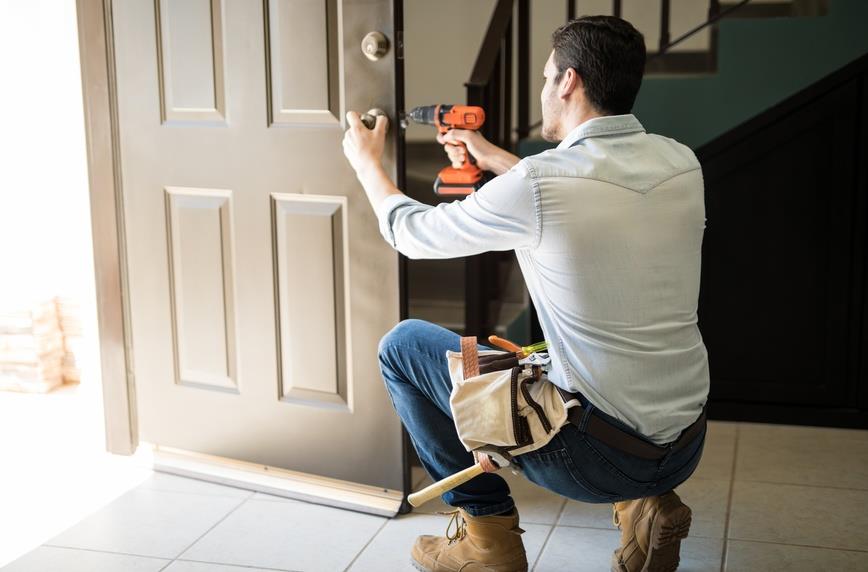What’s the difference between a handyman (or woman) and a contracting pro, and why should you hire one over the other? If you have home projects needing completion, you’ve likely started perusing contractor sites and gathering information on your job and what it should cost. There’s so much information on the internet, it can be overwhelming, and how can you narrow down your hiring choices?
Many handymen have a lot of the same skills contractors have, but they generally do smaller jobs. Sometimes, they are available for less money or will even work for an hourly amount. But there are other considerations.
Scope of Work
Do you have a small project or several in a variety of areas of your home? Example: do you need a sink faucet installed, a new doorknob, plus some trim painting done? If this sounds like you, you might be better off hiring a handyman rather than a general contractor, or individual, specialty contractor to complete each task. Some states, depending on licensing requirements, even limit the amount of work a contractor can perform in a single home for a specific task. Also, some general contractors will not want smaller jobs, especially when the new-construction market is booming. Note that some, but not all, handymen may have general contracting licenses. Check your state and local regulations to find out more about requirements in your locale. Also, read more about this in the licensing requirements section below.
Handymen are great when you have a variety of tasks to do, and you might not have to limit them to the most popular ones. What if you need some painting done and your patio power washed? You’ll likely save money having one person do the task. Also, a general contractor isn’t likely to want to clean gutters or replace the hardware on your gate.
On the other hand, if you want a complete kitchen remodel, you probably are better off hiring a licensed pro who does lots of kitchens, knows how to plumb, do flooring, and finished carpentry. A general contractor will probably be better at this than your average handyman.
Scope of work and cost go hand and hand, so continue reading to find out more.
Type of Work
As stated above, the type of work will also impact your hiring decision. If you have a room of drywall to install, a drywall professional is going to be better at it than your average handyman. They do it all day and drywall finishing is fussy work. If you’ve ever seen sagging drywall or sink holes or cracked joints in a new drywall job, you get the point. Pros are just better and faster at it. On the other hand, if you need a drywall repair or a wall in a closet redone, a handyman might be for you—especially if you have other projects that you need done. Paying one person to do multiple small jobs can be much cheaper than hiring multiple people because you are often going to have a service charge built into your fees, whatever your job.
Painting is another trade that does require some expertise and experience to do it well. If it’s a small fence job or touchup work, a handyman might be fine, but if you’re painting the exterior of your Victorian home, you might want to upgrade to a pro painter.
Some tasks legally require professional licensing. Know that a licensed plumber may cost more than an unlicensed handyman. Get quotes before committing. If you have a small job like a faucet installation, it’s going to be less expensive to go with a qualified handyman. But if you have lots of plumbing to do or lots of painting to do, it might be more cost effective to go with a specialized contractor in the task area you are hiring for.
Cost of Work (Budget)
Generally, you will pay 25-75 per hour for a handyman, that is, if he/she will work hourly. Most contractors won’t work hourly. Some handymen also will only work by the job. The only way to find out is to get a quote—not just one—but several to compare. Rates for contractors are really all over the place and vary by region and the building market, but contractors generally charge more. If budget is a big consideration, then try getting multiple quotes from both handymen and contractors to compare. Also consider that a general contractor might have to contract some of the work out. This means you’re going to pay more because he’ll probably make at least 20% additional on the labor. The more work he/she can complete by himself, the less the job should cost. This is something you’ll want to ask up front. The other reason is that you might like to know who is going to be working in your home.
Handymen are often limited on the total cost of a project. This is dictated by state and/or local laws. Your handyman should be aware of what size jobs he/she can take on and inform you. Example: some states might limit a paintjob to a maximum of $1000. Anything higher would have to be performed by a licensed contractor. As you can see, this can be a little complicated, but this is another reason why you should obtain multiple bids for jobs.
Licensing Requirements
Some states require handymen to be licensed for certain work such as plumbing and electrical. Others don’t. In states with more licensing requirements, you will find the abilities of contractors and handymen to be more compatible and also, less variance in pricing. Again, there are lots of unlicensed, experienced handymen out there who may be very knowledgeable and fastidious in many areas, just like licensed contractors. Conversely, there are licensed contractors who may not do a great job. Do your homework, regardless of who you hire, and if you’re doing any remodeling, ask to see references and photos of previous work and check out online reviews.
Permit Requirements
If you need to pull permits for the work you do, it’s better to hire a contractor—plus, they are responsible for knowing about codes and can even pull the permits for you. Some of them even have established a rapport with the local inspectors, and this will be to your benefit. Handymen jobs are generally smaller tasks that don’t require building permits. Like licensing, permit requirements vary widely from state to state and county to county, but this should help you plan for your next job, whether it’s painting your fence or building a garage. *For more information about hiring pros, read our article on women hiring contractors.
Are You a Professional?
Requests for your services are coming in left and right. Let’s connect and grow your business, together.
-
More like this






